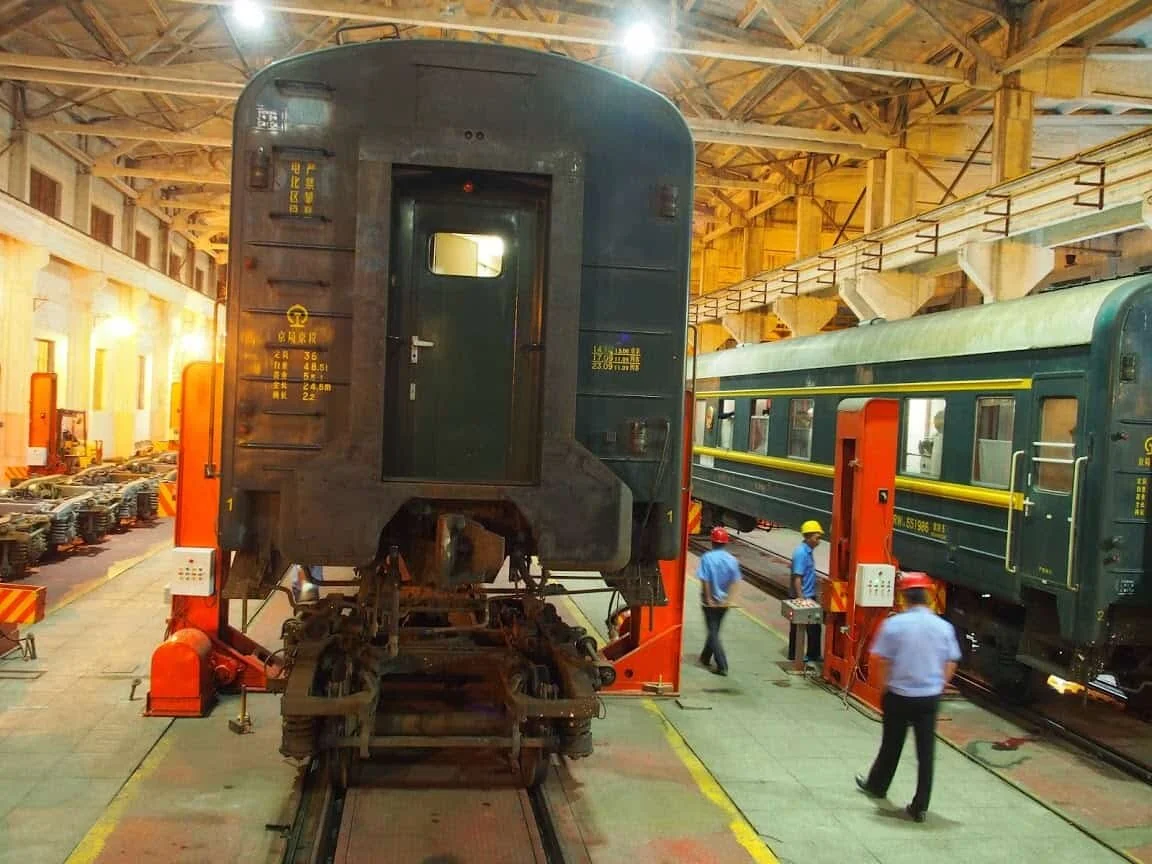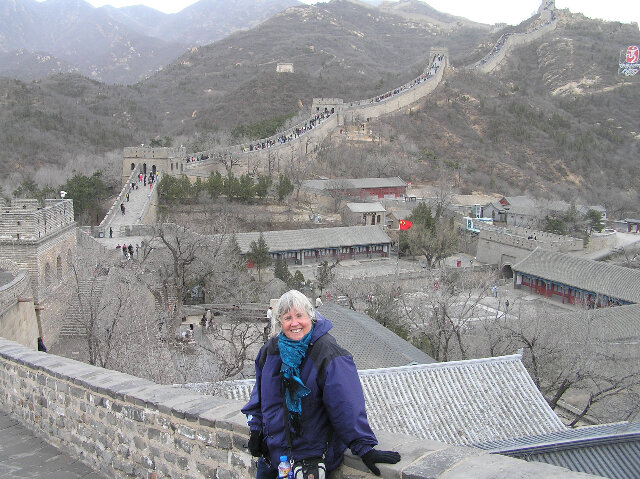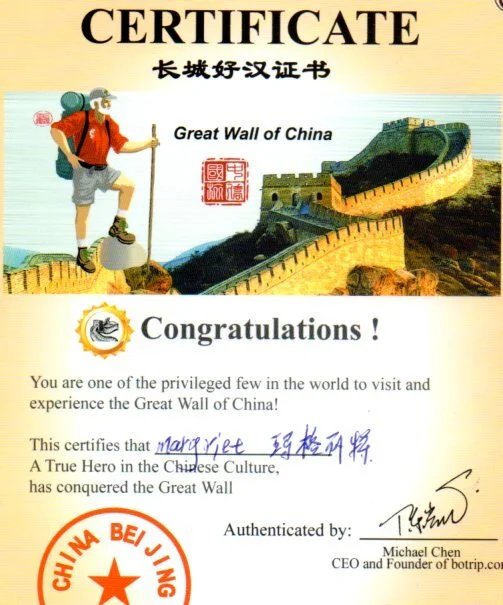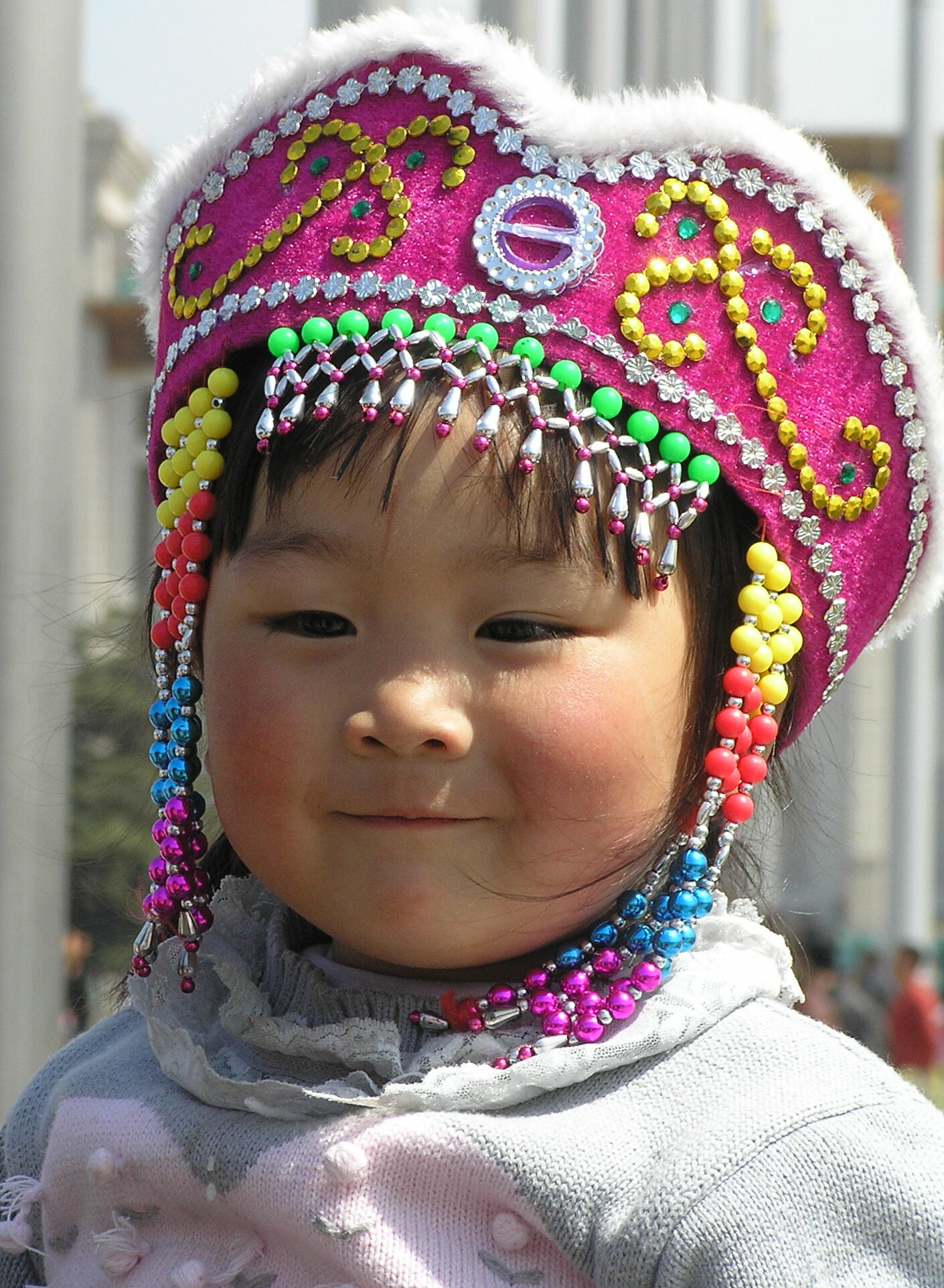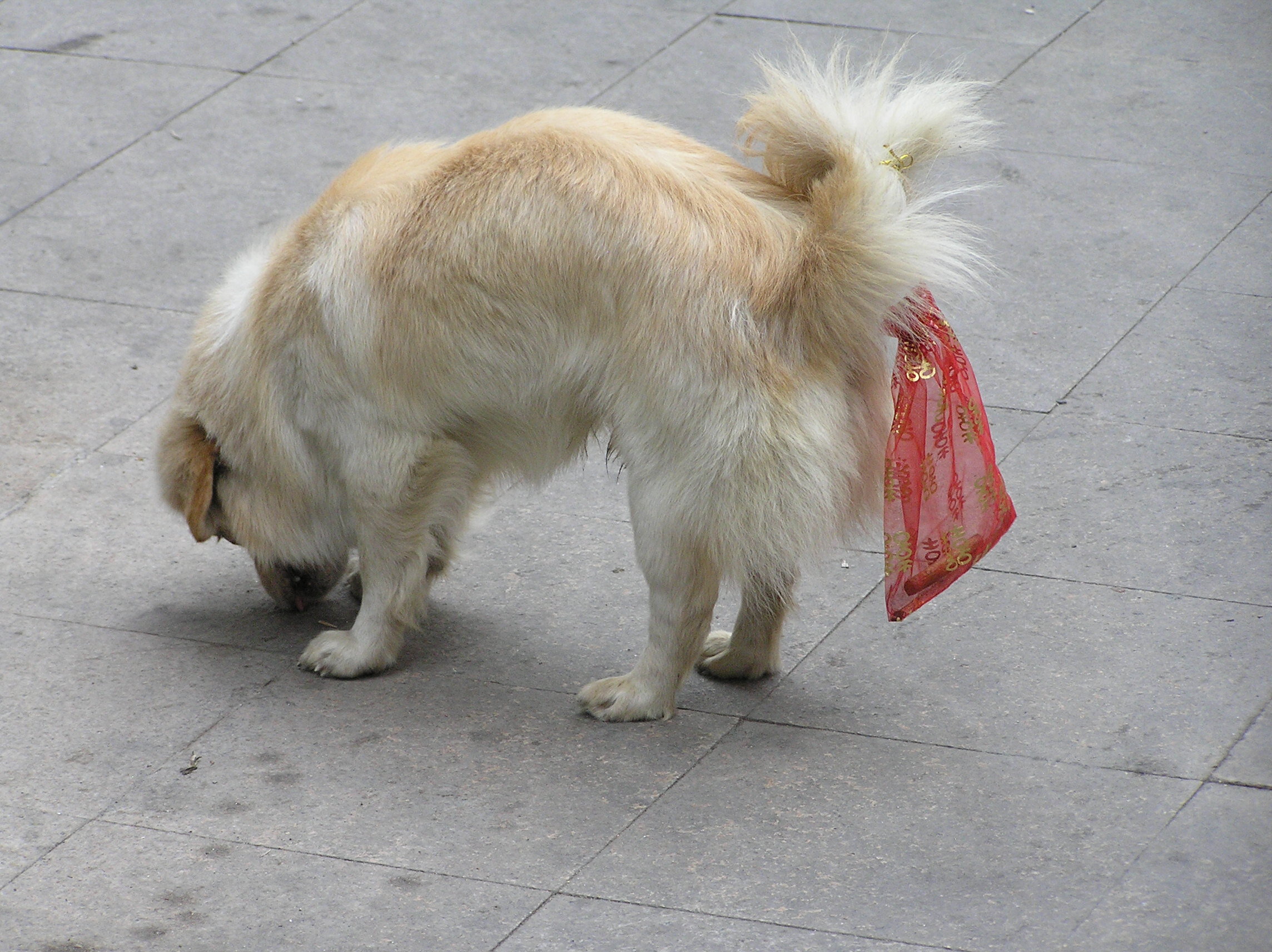Detail, Forbidden City, Beijing
The train ride from Ulaanbaatar, Mongolia to Beijing takes 22 hours. There is no dining car and, coming straight from the Gobi Desert, we didn’t bring much food with us. At 11 PM we stop near the border between Mongolia and China. To our delight, the station has a small store so we stock up on chips, some bread, bananas - hallelujah! - and two cartons of noodles to which we can add hot water. We reuse the cartons to make tea.
The most bizarre thing happens here. The Trans–Mongolian Railway follows an ancient tea-caravan route from China to Russia. But while Mongolian trains run on 1,520 mm (Russian gauge) track, China uses 1,435 mm (standard gauge). For this reason the train cannot simply jump to a different track. Each carriage has to be lifted in turn to have its under carriage changed. The carriages are hoisted into the air, one by one, to change the wheels underneath, allowing the train to switch from Mongolian tracks to Chinese tracks.
While this happens, Immigration and custom officers from Mongolia come by to collect passports and forms, to peek under the seats and in the cracks of the door. After two hours of sitting, switching tracks, uncoupling train cars and moving back and forth, their Chinese counterparts perform the same ritual before we can continue on our way to Beijing.
After midnight we spread our sheets and blanket and try to get some sleep in the bumbling, rumbling train. Sky-sand, sky-sand, sky-sand the wheels click.
When we wake, the view of China is the same: brown. Except there are more hills and, slowly, more villages of brown. If I thought I saw the end of the earth when I first saw the Gobi from the airplane, now we feel like we’ve just returned from the end of the earth.
There is a saying that says ‘Xian is the China of the past, Shanghai is the China of tomorrow, Beijing is the China of today’. Today, we are in Beijing. Arriving at the Beijing train station is a huge contrast to the emptiness of the Gobi: crowds of people everywhere. Immediately, we are accosted by people trying to sell us maps, take us sightseeing, offering taxis. Good thing we had read Lonely Planet and knew how to get a taxi - we would have paid 300 Yuen instead of the 24 it actually cost. We’re surprised at the many rude people - pushing and jumping the line.
I had been worried about having booked a hutong courtyard hotel: hutongs are historic living quarters in the city, a network of narrow streets and alleys, too narrow for cars so accessible on foot only, with traditional small houses, tiled roofs, tiny shops. Before we left I thought it would be more fun to stay in an authentic Chinese hotel rather than in a western Marriott or so. But lacking any comfort in Mongolia I started to dream of clean toilets with paper, running water and some access to western food. Did I make a mistake by booking a small, authentic Chinese hotel?
The taxi dropped us and our luggage at a main road and pointed down a tiny alley - too narrow to drive into. We lugged our packs down the alley as I got more and more worried. However, like a mirage in the desert, the little charming hotel appeared at the end of an inviting little path lined with bamboo. A kind Chinese girl, who spoke some English, showed us to our lovely room with traditional Chinese furnishings and decorations and a huge (bigger than kingsize) bed with a real mattress (Chinese mattresses can be hard as an ironing board). A clean bathroom with a gorgeous Chinese porcelain bowl as sink, a warm shower and a real toilet. Outside our room is a square courtyard with chairs and tables, Chinese lanterns, singing birds. It’s dead quiet in this hutong, away from the main road. We had beer, ran two loads of laundry and started to feel human again.
We celebrated our arrival in Beijing with dinner in a Chinese restaurant where no one spoke English and the menu was only in Chinese. We pointed to pictures of rice, chicken and vegetables. All was well with the world.
Our wonderful hutong hotel.
We woke, rested after our long train ride, from birds singing. What a glorious little oasis this courtyard is. We walked to downtown, ready to face history at Tiananmen Square: the world’s largest public square. It IS huge. At first I thought something was happening: a protest, a meeting? But it was simply thousands of Chinese come to spend Saturday at the square. They streamed from all directions, out of the subway mouth they spewed forth and filled the square like dark water flowing to fill a bowl. Many groups followed leaders with little flags, wearing different colored caps. Parents with children, all of them taking photos. Marching soldiers, security checks, police cars.
Tiananmen Square
We climbed the Gate of Something Heavenly - probably Peace - to take photos from above. We walked back through a shopping street and found... Starbucks! Another oasis we dreamed of in the desert.
Borrowing an umbrella from the hotel because of the grey drizzle, we walked to a nearby subway station the next day and figured out how to buy a ticket to ride the subway downtown. We resurfaced right next to the Forbidden City, for 2 yuen.
We then strolled all over the Forbidden City - impressive in size and number of buildings, but each one looks like the last. Same roofs, same dragons, same colors. Plus a million people. In some palaces you can peek inside but this is often impossible because of the hordes of people pushing to get to the front. We walked and walked and walked. Once outside again we turned into a hutong to enjoy the quietness. We decided to spend the remaining few hours of the day seeing the Lama Temple, the largest Buddhist temple outside Tibet. Golden Buddha statues sat inside these temples.
The following day we were picked up by a tour bus to go see the Great Wall of China, at least a portion of the wall closest to Beijing. There were only eight of us on the small bus. We drove to Ming Tombs first, which we were not terribly interested in but it came as a package deal with The Wall.
Reminiscent of Egyptian tombs, Chinese emperors had all of these huge buildings built, with gates through which their souls would travel to heaven. But seeing how they had numerous beautiful girls killed to keep them company, I doubt they ever saw heaven.
A jade factory was next but no one in our group was interested in buying stuff. I’m not sure how impressed the Chinese store managers were with us since we kept wandering away and doing our own thing. The Chinese visitors tend to march in groups and follow their leader much more obediently. Our young guide was very nice and talked freely about life here. He told us that his parents had 4 children during the time when there was (and still is) a “one couple - one child” rule.
“My parents would have had to pay a high fine but they were farmers and didn’t have much money,” he said, “so the government took all of their possessions, including the furniture” - because they were expecting a fourth child. The fine amounts to 2000 yuen (+ $300), or two annual incomes. He said that in some areas of China an entire family can work very hard and earn as much as 200 dollars a year. He told us that old age pension amounts to about 100 yuen per month (16 dollar). And for self employed farmers there is no such thing as old age pension… When I commented that I was surprised that he could tell us this so freely, he replied “It’s important that you know the real China.”
We drove to the Great Wall at Badaling. The wall itself was impressive. Construction started 2,000 years ago, and took some 600 years. It spanned thousands of kilometers. We saw several lengths running over mountain tops and up the next hills. It’s dotted with several sentinel viewposts. Apparently it never worked as intended: to keep the enemy out. But it did work as an elevated highway and to send smoke signals from one view post to another. The Chinese feared the Mongolians since they were the only ones to ever occupy China. Cold and windy, even snowy, it was worth it to set foot on the Wall and see a very impressive part of human history, visible from space.
A beautiful Chinese child.
What better way to celebrate this special day in Beijing (Peking) with a wonderful dinner of Peking Duck! We wandered through our hutong, an amazing labyrinth of little streets, lined with crooked houses and trees, full of old people and bicycles, corner markets with food, fruit, shoes, etc. to a street full of red lanterns. We ordered Peking Duck for two, sweet & sour pork, rice, jasmine tea and beer. It came with thinly sliced cucumbers and pancakes. For dessert: deep fried pineapple rolls with condensed milk. And the bill was about the same as for two hamburgers back home…
Of course it is great to find signs in English and not only in Chinese. But while teachers of English are in high demand across Asia, editors should be even more widely employed. The misspellings on public signs, brochures and posters is amazing. We see the most hilarious spellings posted at entrances, in banks (“Report to Loss Counter”) and on menus. Here is a sample of what the menu in last night’s restaurant offered:
Peking Duck came in 3 different qualities:
a) High quality goods roast duck
b) two generations duck
c) unwearied effort duck
(We ordered b and it tasted fine, even if it was... two years old maybe?!) Also on the menu were
- greasy fungus soup
- the salmon punctures the body
- blue melon dictyophoron phalloidea soup
- the pot young chicken cooks bothers
- pickpocket chicken (I think this meant stuffed chicken, which is cute)
- the onion explodes mutton
- slightly fries bullfrog
We also noticed ‘romantic beef’ on the menu and were tempted to order it. And, of course, the exit anywhere is labeled as “Way Out.”
The dogs of Beijing deserve a chapter of their own. Where canines in Thailand are all dusty, free roaming mongrels, here they are pampered pets. Perhaps because of the one child rule, people seem to all own small doggies: little white puffy things, poodles, Shih Tzu, pug, pekingese. The lesser ones only wear a pink ribbon in their hair. However, we have seen dogs wearing a denim outfit, black leather pants with a sports jacket, even a white poodle with dyed pink ears, feet and tail. The poor critters don’t seem to mind. One of them came by in a stroller... How could a dog object to that? I think the dog in the photo has a little bag with fragranct herbs dangling from his tail…
And so came our last day in the land of eternal.. what? Spring? Sun? Clouds? Beijing has 21 million people - eternal exhaust perhaps. Eternal plastic bags... It’s time they were banned once and for all. The entire Gobi seemed covered in blown away plastic bags... All corners here in the city cradle wind blown bags... People come and go but plastic bags seems to last forever.
But it’s been one heck of an adventure that we are grateful to have had. And we didn’t get run over by crazy taxis. Toilet paper, we missed you, here we come.
Click ‘books’ to see a list of some of our favorite books about China.


